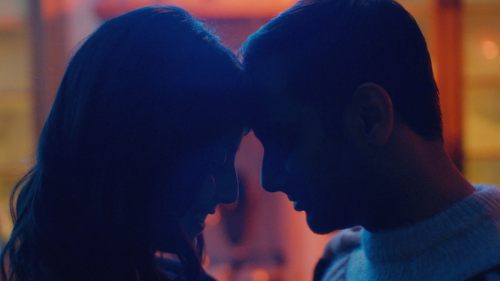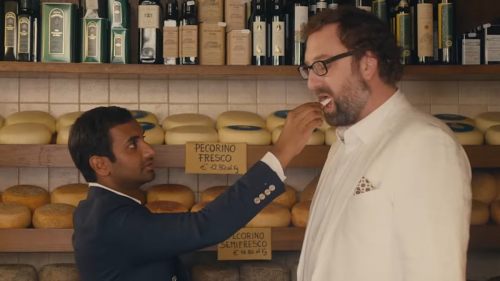Film Crit Hulk SMASH: Master Of None, Heart Of All
When I finished season one of Aziz Ansari's Master of None a lot of people asked if I would write about it. My answer was a little disheartening, because I said there was no real need. All the things that made the first season so great were things that were right there on the surface; a show where all the subtext was in the expressed text, as the characters often verbalize and articulate (beautifully) their thematic conclusions to each in an organic, conflict-driven way. I loved it, but it was evident why we should love it. Flash forward a year or so and the other morning I sat down and turned on my Netflix to put on a fireplace log while I did some work, but then I saw the prompt for season two pop up on my screen. So I said fuck it, I'll give it a little watch... and I finished the entire season by midnight.
It's a masterpiece.
One one level it does many of the same things that make the first season so good. It often tackles an issue or a story at a time in each episode. It verbalizes a lot of the unique social pressures and realities that face different generations of Indian Americans. It normalizes ethnic depictions across the board. It captures a range of humor that characterizes the lives of these sweet, silly, well-meaning, progressive millennial New Yorkers. There's the fantastically structured "first dates" episode that hits the rhythm of the zeitgeist with disturbing acumen. It also completely doubles down on the love of food and explores every nook and cranny it has to offer (and if you know my instagram, you know I am similarly obsessed). It finds ways to wring conflict out of the smallest little elements of life, from awkward dates to unspoken romances, and fills the stories full of emotional stakes that matter for the pure of heart. But what is so remarkable about the second season is the way it subtly, but significantly shifts its cinematic language and approach.
The season begins a black & white shot that pans over to a stack of Criterion Collection blu rays. Okay that's not so subtle, but the entire first episode, "The Thief" unfurls a full-homage The Bicycle Thief upon us. Only instead of highlighting the crisis of poverty in post-war italian neo-realism, it showcases the minor plights of an American living in small-town Italy. We're a talking a stolen phone, a lost girl's phone number after a great connection, and the aching tragedy of a spilled lasagna. These things matter because we know they matter deeply to Dev, but more what I like about all of these choices is the honesty of them. There is no show more honest about the day-to-day "tragedy" of mild inconveniences and fully understands the privilege of its characters. It's worn right on it's sleeve. Just as he's not trying to hide his straightforward love of Criterion films and Italian classics. Because he's not trying to aimlessly ape them or even mask them in or to gain some aloof coolness. This isn't mere pastiche. In fact, Ansari's turning right into the artifice with a ton of awareness.
It's actually a familiar riff we see with a branch of Brechtian cinema (which can sort of be boiled down to the use of a distancing effect to fully pull-off an idea), only it's using the stagey artifice to bring you more into the fun and mindset of the characters. For example, it's not unlike the diorama staging and stilted acting of Wes Anderson, it's stilted, but he's conveying a loving emotion with it. But instead, Ansari fills his frames with unpolished actors who scream authenticity. He lovingly frames his lonely self walking outside a party to send a text. The point of all this is clear: "I'm putting my silly life into this artifice" and it's lovely high-low. Better yet, all this cute artifice largely works as clever set up before sliding into the deeply personal, intimate, and heartbreaking depths of the stories. By season's end, I was enamored with the approach, and worth noting that Ansari directed all four episodes that used this tactic himself.
But outside of Ansari's own storyline, the second season is getting attention (deservingly so) for its treatment of the other characters. I'm even seeing the word "generosity" thrown around and I think that is also deserving. It's so easy to press one's own story, and Ansari does not shy away from it, but the full-on loving embrace of two episodes in particular have earned the most praise. The first entitled "Thanksgiving" was with Lena Waithe and centers on her character Denise. It tells the story of her relationship with her mother (and three generations of black women) over the course of 30 years of Thanksgivings, and in telling this story it beautifully touches on intersections of race, homosexuality, and sexism. It's a story that is not only woefully underrepresented, but more than that, it's just an excellent episode of television. Not just in the way that it's lovingly directed by Melina Matsoukas, but it's simply a good story, well-told. The way it introduces the conflicts, holds through all of them, letting you know and understand the subtle changes along the way in the time jumps, all before finding the most understandable and organic paths to resolution. It's downright remarkable.
The second episode of note is "I Love New York" and ties back into how the show acknowledges differences between people. Again, it showcases both an awareness of and acknowledgement of the privilege of the main characters. One fully elaborated when put against this episode wherein the daily attention to Dev and crew is ceded and we instead slide into the stories of a Doorman who works in an upper-class apartment, a young deaf cashier, and cabbie. It would normally be the sort of student-film slice of life Americana I've seen a million times before, but it avoids every damn pratfall. Because one of the biggest problems with indie films about the lower class / poverty is that a lot of filmmakers are capturing that as a way of weirdly trying to "be" that. Sometimes it can be naked cultural appropriation, sometimes it's more subtle and insidious. But what is so remarkable about this episode and Master of None is that they are honest about the intersections and distance created by privilege. The way a doorman will casually get asked to do immoral things as a way of maintaining the dweller's lives. The way cabbies are invisible and no one would think they could spoil a movie for them. The way we'd always expect a deaf person's life to be about being deaf instead of just being about her normal love life. And what is particularly amazing is the way the show is not only self-critical in this regard, yet somehow not judgmental / humane at the same time. No moralizing. Just showing. This is a show that is only really ever about illumination and learning. And to that it always wants to illuminate the actual differences in culture without ever trying culture surf.
It is yet another thing that makes this show so wonderful, to the point that I've never wanted to hug a piece of entertainment more. There are many who have talked about Aziz Ansari's well-meaning heart and it's evident right in the DNA of the whole season. I always talk about the way art has souls and personalities, and with Master of None, it is an a good friend and artist who can walk you through his life and love and interests, but whose best quality is the ability to sit down with you and sincerely ask you the following question: "How was your day?"
And, like most loving people, it will be genuinely interested in the answer.
<3 HULK



